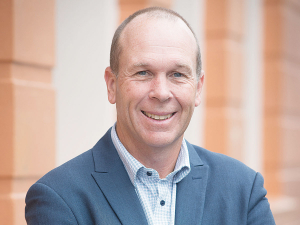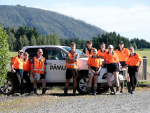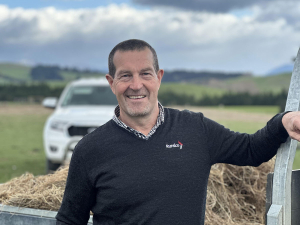State farmer Landcorp (Pāmu) has returned a solid profit for the year ended June 2022, but says rising costs, weather and Covid disruptions are putting pressure on its bottom line.
It achieved a net profit of $59 million, more than double its profit of $29m the year before. However, this was inflated with an $18m book value gain from the reversal of historical revaluation losses on land and buildings, as well as a $20m fair value gain on biological assets.
Chief executive Mark Leslie says the result reflected good product prices and steady revenue growth across the business.
"The result is particularly pleasing given the significant input cost pressures farmers are facing because of the continuing Covid-19 pandemic, the Russia-Ukraine conflict impacting feed, fuel and fertiliser costs and general inflationary pressure."
The company reported earnings before interest, tax, depreciation, amortisation and revaluations (EBITDAR) of $75m, a 23% increase on the previous year's $61m. Revenue rose 14% to $287m - largely due to increases in revenue from its livestock and dairy businesses.
Leslie added that farm production and earnings were constrained by extreme weather events, including floods on the West Coast and in the Manawatū, and drought in the Te Anau basin. Pāmu's total operating expenses were up 17.6% to $220m.
Leslie says despite tight budget control, spending on pasture maintenance, cropping and feed costs was up 20.3% to $71m, from $59m in the previous year.
The state farmer's returns were also helped by the rising value of carbon credits, alongside gains on farm sales on the West Coast and in the Wairarapa to Ngāti Kahungunu ki Wairarapa.
"The business is in very good shape, and we have a clear strategy to further enhance the value Pāmu brings to New Zealand," Leslie claims.
"This includes ongoing environmental and emissions reduction work across our portfolio. With our first 20 farms now Toitū carbon certified, we will be looking to certify more farms this year and expect all farms to be certified by 2024."
He added that its equity investments during the year in FarmIQ and Spring Sheep had also helped the bottom line.
"These invesments support digitisation of farming and provide another land-use option (sheep milking) in districts facing environmental and farm size constraints."
The company will pay a $5 million dividend to the Government.
Key Highlights...
Total revenue $287, up 13.9% from the 2020/21 ($252 million).
Livestock revenues benefitted from higher product prices across the board. Overall revenue rose 13.4% to $127 million ($112 million in the previous year) with the biggest gain in sheep.
Livestock processing capacity limitations due to the impact of Covid-19 and shipping constraints saw the company finish fewer sheep and cattle during 2021/22.
Milk revenue rose 4% to $120 million in 2021/22 ($115 million) with a weighted average of $9.48 per kg of milk solids (kgMS).
Wool revenue was unchanged at $3 million, as was revenue from forestry harvesting at $2 million.
Pāmu continued to earn carbon credit from integrating plantation forests into its farming operations. Revenue from all carbon credit activities was $13 million, up from $8 million in the previous year.
Total operating expenses rose 17.6% to $220 million ($187 million in the previous year) as higher input costs pushed up farm working and maintenance expenses by 16.7%.



















